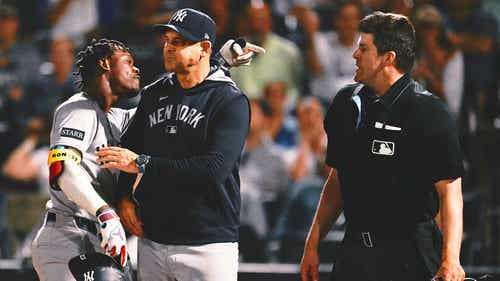
How A's can move — and appease Giants
The Los Angeles Dodgers soon will be sold. The San Diego Padres’ ownership struggle is starting to resolve. The owners of the New York Mets are in a far stronger position than they were a week ago.
That leaves two problem children for baseball — the Tampa Bay Rays, who lack an obvious solution, and the Oakland Athletics, whose solution is plain for all to see.
Commissioner Bud Selig needs to get the A’s to San Jose. He needed to do it yesterday, last month, any time during the period since he appointed a special committee to study the team’s situation three years ago.
Alas, it’s not that simple.
Selig can’t deliver a lightning bolt from the sky the way NFL Commissioner Roger Goodell did to New Orleans Saints coach Sean Payton, as if it took any courage or particular wisdom for Goodell to penalize borderline criminal behavior.
No, Selig was left with this mess because the two teams involved, the A’s and the San Francisco Giants, can’t figure out a resolution. And while the commissioner is working actively behind the scenes, according to major league sources, this issue is more complex than most.
Still, the Athletics are tired of waiting. San Jose is tired of waiting. And the rest of baseball should be tired of waiting, too — the A’s will be a revenue-sharing recipient as long as they remain in Oakland, but after a few years in a new ballpark in San Jose they actually might become a payer.
I spoke last week with a San Jose City councilman, Sam Liccardo, who said that he is “very willing” to explore the possibility of an antitrust lawsuit against baseball, “if our hand is forced by lawyers, lobbyists and baseball executives in San Francisco who persist in arguing that competition is healthy for every other industry and competition in America except their own.”
I also spoke with an expert in the field, Tulane law professor Gabe Feldman, who said that such a suit would be a “real longshot.” Even if the Supreme Court allowed San Jose to challenge baseball’s antitrust exemption, Feldman said, the city would face a second hurdle — other legal precedent that allows sports leagues to place reasonable restrictions on relocation.
One could argue that the restrictions on the Athletics are not reasonable, particularly when the A’s want to move further away from the Giants than they are now. Still, the process of trying to prove such a point would take years, with no guarantee of success.
A lawsuit is not the answer. The Athletics staying in the depressed Oakland market is not the answer. The Giants losing their territorial rights by a three-quarters vote of the owners is not the answer.
The answer is a deal — a deal not unlike the one that baseball cut for the Baltimore Orioles when the Washington Nationals moved into their territory in 2005.
That agreement established a regional sports network that serves the two teams under terms extremely favorable to the Orioles. The Giants and Athletics, both of whom are under contract to Comcast Sports Net, do not require such a component.
But the other part of the Orioles/Nationals deal — baseball’s guarantee to the Orioles that they would receive at least $130 million in annual revenues and $360 million if the team is sold — absolutely applies to the Bay Area dispute.
The Giants’ concerns about losing their share of the lucrative South Bay market are legitimate — and never mind that the Giants only acquired the territorial rights to the area when former A’s owner Walter Haas granted them to former Giants owner Bob Lurie at a time when the Giants were considering moving to St. Petersburg, Fla.
The Giants worked hard to develop the South Bay market, just as the Orioles once worked hard to develop the D.C. market. And, when John Fisher and Lewis Wolff bought the Athletics in 2005, Selig explicitly told them they should not plan on relocating the franchise, sources say.
Well, things change.
Only a few hardy souls — a latter-day version of the flat-earth society — believe the Athletics still can make it in Oakland. San Jose is the largest city in the Bay Area. A new ballpark in the city not only would transform the Athletics’ business model, but baseball’s as well.
It’s not just that the A’s would cease to be the sport’s Little Orphan Annies, collecting millions annually in revenue sharing. Even if I didn’t work for FOX, I could figure out that baseball would prefer San Jose to Oakland when negotiating its national television contracts.
Yet, the balance here is so delicate.
Baseball needs to protect the Giants’ interests, too.
The Giants privately financed their ballpark. They say they need to draw 3.25 million each season to break even. And while it might be difficult for them to show just how much they would be harmed financially by the Athletics’ move to San Jose, there would be damage, without question.
That’s why the Giants need financial guarantees from baseball. Ideally, the sport does not want to be in position to prop up multiple franchises. But what are the odds that it would even need to grant such assistance?
Forbes, in its most recent report on franchise valuations, valued the Orioles at $460 million, or $100 million over baseball’s guaranteed sale price. The publication also pegged the team’s annual revenue at $179 million, or $49 million over baseball’s guarantee.
Baseball says every year that the Forbes numbers are inaccurate, but it’s highly doubtful that the publications’ estimates for the Orioles are so far off that the team is in actual danger of needing assistance from baseball.
The Giants’ guarantees surely would be higher — baseball business is booming, if you haven’t noticed — and perhaps the team would require other elements to the deal.
Whatever, Selig needs to figure it all out. How to get the Athletics to San Jose. How to make the Giants whole.
The process should not have taken three years. But better now than later. Better late than never.








